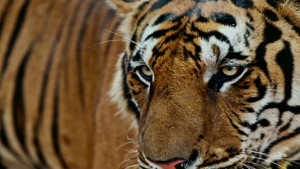The South China tiger is considered "functionally extinct,"
as it has not been sighted in the wild for more than
25 years.
The World Wide Fund for Nature's Living Planet Index, released Tuesday, revealed the dramatic decline in animal species, and said the trend could cost the world billions in economic losses.
 |
| The population of Yangtze finless porpoises is declining rapidly. The freshwater dolphins are suffering due to pollution and hunting. |
The fund notes that it's relying on a never-before-used methodology in this year's report, "which aims to be more representative of global biodiversity."
The index showed shows a 52% decline in wildlife between 1970 and 2010, far more than earlier estimates of 30%. It is due to people killing too many animals for food and destroying their habitats.
"We are eating into our natural capital, making it more difficult to sustain the needs of future generations," the report said.
Researchers from the Zoological Society of London looked at changes in populations of more than 3,000 species of mammals, birds, reptiles, amphibians and fish, tracking over 10,000 different populations.
The decline in animals living in rivers, lakes and wetlands is the worst -- 76% of freshwater wildlife disappeared in just 40 years. Marine species and animals living on land suffered 39% decline in their populations.
Animals living in tropics are the worst hit by what WWF calls "the biggest recorded threats to our planet's wildlife" as 63% of wildlife living in tropics has vanished. Central and South America shows the most dramatic regional decline, with a fall of 83%.
And while the animals are suffering now, the long-term impact will be on people, the report said.
Marco Lambertini, director general of WWF International, said "protecting nature is not a luxury....it is quite the opposite. For many of the world's poorest people, it is a lifeline."
According to Lambertini, the threat to oceans could create economic losses of up to $428 billion by 2050. The global fishing sector employs more than 660 million people, and fish provide more than 15% of protein in people's diet.
Global food security is under threat as the demands of growing population drain the resources. Forests provide water, fuel and food for more than billion people, including 350 million of the world's poorest people.
~~~~~
~~~~~
FELLOW HUMANS: This is dire! A recommendation:
FOR ONE DAY (per week, per month?), each individual, each company can STOP!
STOP POLLUTING, POACHING, PRODUCING, CONSUMING (PPPC) if we care. If we don't...
WWF Species Directory
| Common name | Scientific name | Conservation status ↓ |
|---|---|---|
| Amur Leopard | Panthera pardus orientalis | Critically Endangered |
| Black Rhino | Diceros bicornis | Critically Endangered |
| Cross River Gorilla | Gorilla gorilla diehli | Critically Endangered |
| Hawksbill Turtle | Eretmochelys imbricata | Critically Endangered |
| Javan Rhino | Rhinoceros sondaicus | Critically Endangered |
| Leatherback Turtle | Dermochelys coriacea | Critically Endangered |
| Mountain Gorilla | Gorilla beringei beringei | Critically Endangered |
| Saola | Pseudoryx nghetinhensis | Critically Endangered |
| South China Tiger | Panthera tigris amoyensis | Critically Endangered |
| Sumatran Elephant | Elephas maximus sumatranus | Critically Endangered |
| Sumatran Orangutan | Pongo abelii | Critically Endangered |
| Sumatran Rhino | Dicerorhinus sumatrensis | Critically Endangered |
| Sumatran Tiger | Panthera tigris sumatrae | Critically Endangered |
| Vaquita | Phocoena sinus | Critically Endangered |
| Western Lowland Gorilla | Gorilla gorilla gorilla | Critically Endangered |
| Yangtze Finless Porpoise | Neophocaena asiaeorientalis ssp. asiaeorientalis | Critically Endangered |
| African Wild Dog | Lycaon pictus | Endangered |
| Amur Tiger | Panthera tigris altaica | Endangered |
| Asian Elephant | Elephas maximus indicus | Endangered |
| Bengal Tiger | Panthera tigris tigris | Endangered |
| Black Spider Monkey | Ateles paniscus | Endangered |
| Black-footed Ferret | Mustela nigripes | Endangered |
| Blue Whale | Balaenoptera musculus | Endangered |
| Bluefin Tuna | Thunnus spp | Endangered |
| Bonobo | Pan paniscus | Endangered |
| Bornean Orangutan | Pongo pygmaeus | Endangered |
| Borneo Pygmy Elephant | Elephas maximus borneensis | Endangered |
| Chimpanzee | Pan troglodytes | Endangered |
| Eastern Lowland Gorilla | Gorilla beringei graueri | Endangered |
| Fin Whale | Balaenoptera physalus | Endangered |
| Galápagos Penguin | Spheniscus mendiculus | Endangered |
| Ganges River Dolphin | Platanista gangetica gangetica | Endangered |
| Giant Panda | Ailuropoda melanoleuca | Endangered |
| Green Turtle | Chelonia mydas | Endangered |
| Hector's Dolphin | Cephalorhynchus hectori | Endangered |
| Humphead Wrasse | Cheilinus undulatus | Endangered |
| Indian Elephant | Elephas maximus indicus | Endangered |
| Indochinese Tiger | Panthera tigris corbetti | Endangered |
| Indus River Dolphin | Platanista minor | Endangered |
| Loggerhead Turtle | Caretta caretta | Endangered |
| Malayan Tiger | Panthera tigris jacksoni | Endangered |
| North Atlantic Right Whale | Eubalaena glacialis | Endangered |
| Orangutan | Pongo abelii, Pongo pygmaeus | Endangered |
| Sea Lions | Zalophus wollebaeki | Endangered |
| Sei Whale | Balaenoptera borealis | Endangered |
| Snow Leopard | Panthera uncia | Endangered |
| Sri Lankan Elephant | Elephas maximus maximus | Endangered |
| Tiger | Endangered | |
| Whale | Balaenoptera, Balaena, Eschrichtius, and Eubalaen | Endangered |
| African Elephant | Loxodonta africana | Vulnerable |
| Bigeye Tuna | Thunnus obesus | Vulnerable |
| Dugong | Dugong dugon | Vulnerable |
| Forest Elephant | Vulnerable | |
| Giant Tortoise | Vulnerable | |
| Great White Shark | Carcharodon carcharias | Vulnerable |
| Greater One-Horned Rhino | Rhinoceros unicornis | Vulnerable |
| Irrawaddy Dolphin | Orcaella brevirostris | Vulnerable |
| Marine Iguana | Amblyrhynchus cristatus | Vulnerable |
| Olive Ridley Turtle | Lepidochelys olivacea | Vulnerable |
| Polar Bear | Ursus maritimus | Vulnerable |
| Red Panda | Ailurus fulgens | Vulnerable |
| Savanna Elephant | Loxodonta africana Africana | Vulnerable |
| Southern rockhopper penguin | Eudyptes chrysocome | Vulnerable |
| Whale Shark | Rhincodon typus | Vulnerable |
| Albacore Tuna | Thunnus alalunga | Near Threatened |
| Beluga | Delphinapterus leucas | Near Threatened |
| Greater Sage-Grouse | Centrocercus urophasianus | Near Threatened |
| Jaguar | Panthera onca | Near Threatened |
| Monarch Butterfly | Danaus plexippus | Near Threatened |
| Mountain Plover | Charadrius montanus | Near Threatened |
| Narwhal | Monodon monoceros | Near Threatened |
| Plains Bison | Bison bison bison | Near Threatened |
| White Rhino | Ceratotherium simum | Near Threatened |
| Yellowfin Tuna | Thunnus albacares | Near Threatened |
...and HUMANS!



























































4 comments:
I can't believe it Petra! What is the WWF? They can measure this fact with certainty? Because if it's true, we're in deep doo doo.
This is a lot to take in! I know we've been warned of climate change for a long time, but this just cannot be true?!
K. :(
Petra, as sad and difficult as this is to read, I thank you for publishing it because as you shared, this is dire!
Between the pollution, poaching producing, and consuming PPPC, we're draining our resources with carelessness.
Again, thank you for sharing this information, my friend!
X
Hi, K. Yes, it's hard to believe. When I became involved in the environment, it was the 60's when the scientists were warning then about the near extinction of many animals and worldwide pollution.
The WWF is the World Wide Fund for Nature, a nature conservation organization previously named the World Wildlife Fund.
It's a highly respected and reliable organization which began in the 60's; its headquarters are in Switzerland.
I knew we were heading in this direction but had no idea how severe it was when the report came out.
Our generation has lived a relatively good life. It's our future generations that I'm concerned with. I don't know how many times it's come up with my nieces and nephews, how important it is they get involved because it's all they have.
Not enough in power are doing enough. I'm very concerned,
K. :((
Hi, Ron. Yes, it was very difficult to read but easy to post because how else will we do what we must and need to know. I truly believe it's overwhelming for most to comprehend such statistics. I've been involved in the environment since the cries from scientists in the 60's.
I just don't think many can wrap their minds around such overwhelming statistics. They don't know what to do other than recycling cans and plastics. It will take much more from those in power and the powerful are those who do the worst damage. If they don't come around, I cannot imagine, Ron. :((
Post a Comment